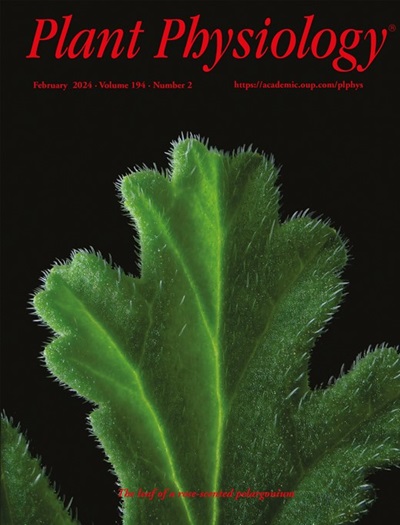MID1-COMPLEMENTING ACTIVITY 通过 Ca2+ 信号调节马钱子的细胞增殖和发育
IF 6.9
1区 生物学
Q1 PLANT SCIENCES
引用次数: 0
摘要
MID1-COMPLEMENTING ACTIVITY(MCA)是一种陆生植物特有的质膜蛋白和 Ca2+ 信号转导成分,能对各种植物物种的外源机械刺激(如触觉、重力和低渗-渗透胁迫)做出反应。在水稻(Oryza sativa)和玉米(Zea mays)的生长发育过程中,MCA 对细胞增殖和分化至关重要。然而,MCA 通过 Ca2+ 信号介导细胞增殖和分化的机制仍然未知。在这里,我们利用肝草 Marchantia polymorpha 解决了这个问题。我们发现,M. polymorpha的MCA直向同源物MpMCA在分裂活跃的区域高度表达,例如顶端凹口的顶端和发育中的配子管胞,而且MpMCA是一种质膜蛋白。利用 Ca2+ 传感器(黄色浮游生物)进行的体内 Ca2+ 成像显示,MpMCA 是维持顶端凹口区域、卵细胞和花药细胞中正常 [Ca2+]cyt 水平的必要条件。Mpmca突变体植株的花被、配子管胞和配子囊出现严重的细胞增殖和分化缺陷,导致发育异常和受精失败。此外,拟南芥 MCA1 基因的表达补充了 Mpmca 突变体植株生长发育的大部分缺陷。我们的研究结果表明,MpMCA是一种进化保守的Ca2+信号元件,它在陆生植物的整个生命周期中调节细胞的增殖和发育。本文章由计算机程序翻译,如有差异,请以英文原文为准。
MID1-COMPLEMENTING ACTIVITY regulates cell proliferation and development via Ca2+ signaling in Marchantia polymorpha
MID1-COMPLEMENTING ACTIVITY (MCA) is a land plant-specific, plasma membrane protein and Ca2+ signaling component that responds to exogenous mechanical stimuli, such as touch, gravity, and hypotonic-osmotic stress, in various plant species. MCA is essential for cell proliferation and differentiation during growth and development in rice (Oryza sativa) and maize (Zea mays). However, the mechanism by which MCA mediates cell proliferation and differentiation via Ca2+ signaling remains unknown. Here, we address this question using the liverwort Marchantia polymorpha. We show that the M. polymorpha MCA ortholog, MpMCA, is highly expressed in actively dividing regions, such as apical notches in the thalli and developing gametangiophores, and that MpMCA is a plasma membrane protein. In vivo Ca2+ imaging using a Ca2+ sensor (yellow cameleon) revealed that MpMCA is required for maintaining proper [Ca2+]cyt levels in the apical notch region, egg cells, and antheridium cells. Mpmca mutant plants showed severe cell proliferation and differentiation defects in the thalli, gametangiophores, and gametangia, resulting in abnormal development and unsuccessful fertilization. Furthermore, expression of the Arabidopsis MCA1 gene complemented most of the defects in the growth and development of the Mpmca mutant plants. Our findings indicate that MpMCA is an evolutionarily conserved Ca2+-signaling component that regulates cell proliferation and development across the life cycle of land plants.
求助全文
通过发布文献求助,成功后即可免费获取论文全文。
去求助
来源期刊

Plant Physiology
生物-植物科学
CiteScore
12.20
自引率
5.40%
发文量
535
审稿时长
2.3 months
期刊介绍:
Plant Physiology® is a distinguished and highly respected journal with a rich history dating back to its establishment in 1926. It stands as a leading international publication in the field of plant biology, covering a comprehensive range of topics from the molecular and structural aspects of plant life to systems biology and ecophysiology. Recognized as the most highly cited journal in plant sciences, Plant Physiology® is a testament to its commitment to excellence and the dissemination of groundbreaking research.
As the official publication of the American Society of Plant Biologists, Plant Physiology® upholds rigorous peer-review standards, ensuring that the scientific community receives the highest quality research. The journal releases 12 issues annually, providing a steady stream of new findings and insights to its readership.
 求助内容:
求助内容: 应助结果提醒方式:
应助结果提醒方式:


